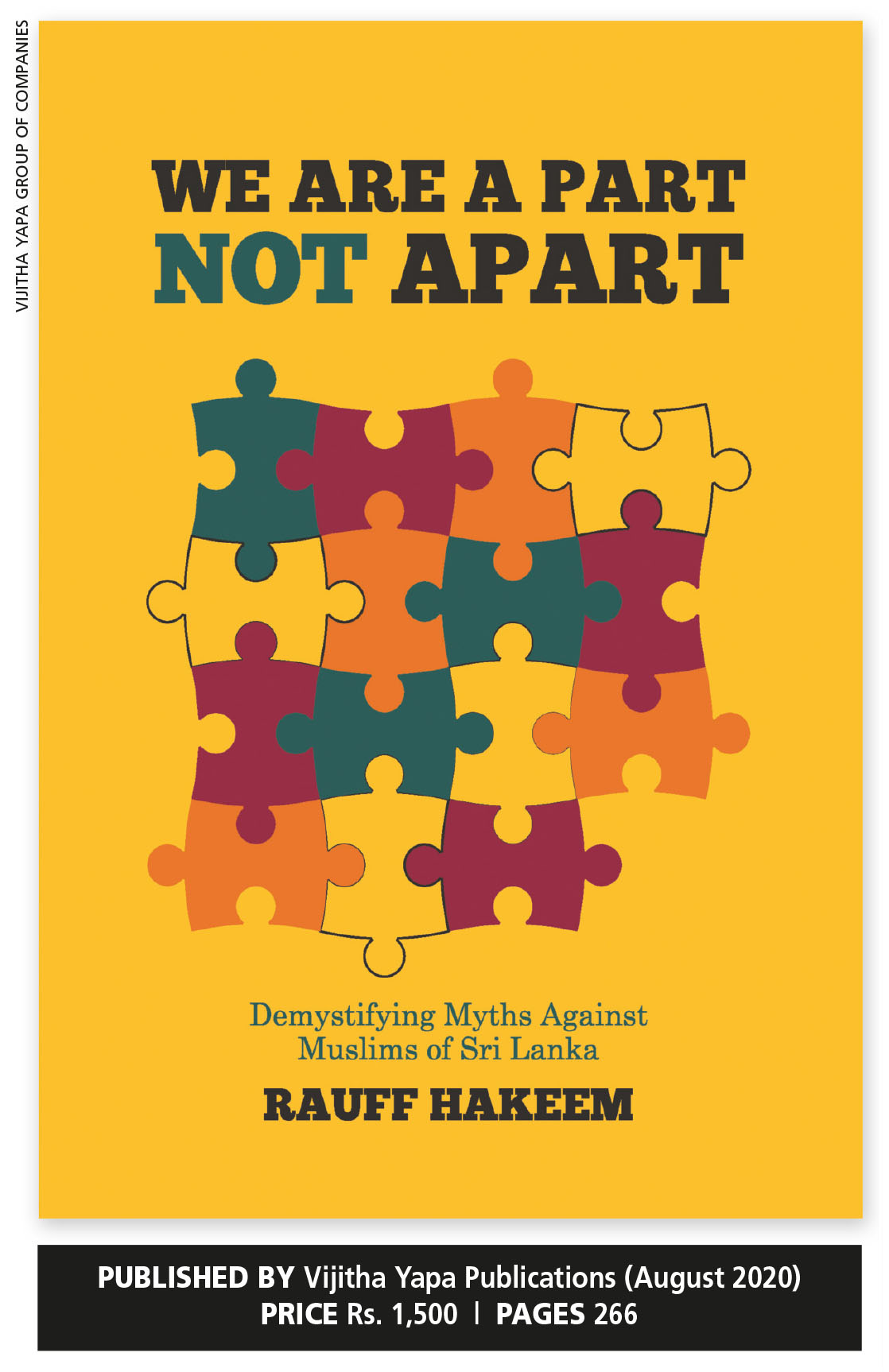BOOKRACK
By Vijitha Yapa
While the derogatory Sinhala term ‘marakkalaya’ is familiar here in Sri Lanka, the origin of the word marakkala is hardly known. In his book, Rauff Hakeem reveals that the word is derived from the phrase ‘maa raekka lae,’ which means ‘the blood that saved me.’
It invokes folklore about a Muslim woman who was killed for saving the king.
When the Portuguese began attacking Muslim traders in the 16th century, King Senarat of Kandy protected many, allowing them to settle in the central highlands and along the eastern coast of the island. Events such as these led to the Muslims associating closely with the Sinhalese, though traditionally their mother tongue is Tamil.
These historical facts are forgotten by rabble-rousers who are only interested in scoring cheap political points rather than looking to the future stability of the country. So this publication is an eye-opener on many facets that aren’t highlighted in the media.
In his review of the book in the Daily FT, Dr. Dayan Jayatilleka writes: “It’s exceedingly well written, ably argued, poignantly polemical and far more literate than I have encountered in the writings of any contemporary [Sri] Lankan parliamentarian or political personality.”
Hakeem discusses inter alia the COVID-19 pandemic, angry because the Muslim community was singled out and stigmatised as disease spreaders, in the case of a virus that knows no ethnic, religious or class boundaries. And he recognises that the blaming and shaming of Muslims following the Easter Sunday bombings have taken on frightening proportions. In fact, he fears for his community.
The author avers his book “is an effort to critically examine the forces that pull us apart.” He attempts to mitigate the deep divide and suspicions that exist between Sinhalese and Muslims, striving to frame this publication as a sociopolitical covenant for the Muslims of Sri Lanka.
He argues that Muslims must painfully accept that the Easter Sunday carnage has brought their community to a crossroads in history.
With regard to the structure of the Sri Lankan state, Hakeem claims that its unique character has been built and shaped by what he calls ‘Sinhala Buddhism.’ He asserts: “Forgetting that cardinal principle would be something akin to discussing the French Revolution without reference to the Storming of the Bastille.”
By analysing the issue at length, Hakeem attempts to answer questions that are excruciatingly painful to consider – such as who are the Muslims and to what do they belong? He’s honest enough to admit that by constant defensive posturing, the Muslims have also contributed to the stereotyping of their community.
This book attempts to dispel clichés that deride Islam in Sri Lanka and implore the Muslim community to engage in self-reflection as a vibrant constituent of a rural economy.
Some other issues dealt with in this book include a purported increase in the Muslim population in Sri Lanka and a fear that it will outgrow that of the Sinhala-Buddhists. He uses graphics, as well as facts from the Department of Census and Statistics, to show that this is not the case, citing research findings by Senior Professor of Demography and former Vice Chancellor of the University of Colombo Lakshman Dissanayake.
Hakeem addresses other controversial issues too, and challenges the notion that Islam and its practitioners are a threat to Sinhala-Buddhist culture.
Another controversy that’s mentioned is the one of Dr. Seigu Shihabdeen Mohamed Shafi from Kurunegala who stands accused in the court of public opinion of surreptitiously excising the fallopian tubes of thousands of Sinhala-Buddhist women. Hakeem notes with sarcasm that a Buddhist monk parliamentarian had emerged overnight as an expert on fallopian tubes and fertility treatment for women.
Recently, Kurunegala was in the news once more when part of the assembly hall of King Buvanekabahu II was demolished by the mayor. Some politicos claim the king had been married to a Muslim woman.
An important section in this book covers the TV debate Hakeem had with Udaya Gammanpila in June last year. The transcript of the debate is published and the reader can judge the issues involved, as well as the facts presented therein.
Regarding the niqab (face cover) that some Muslim women wear, Hakeem supports the view that it has nothing to do with Islam. Ironically with the COVID-19 outbreak, some countries have declared that wearing face masks is essential.
This well researched book can contribute greatly to demystifying the myths that extremists propagate in their efforts to tear up the social fabric of Sri Lanka.




